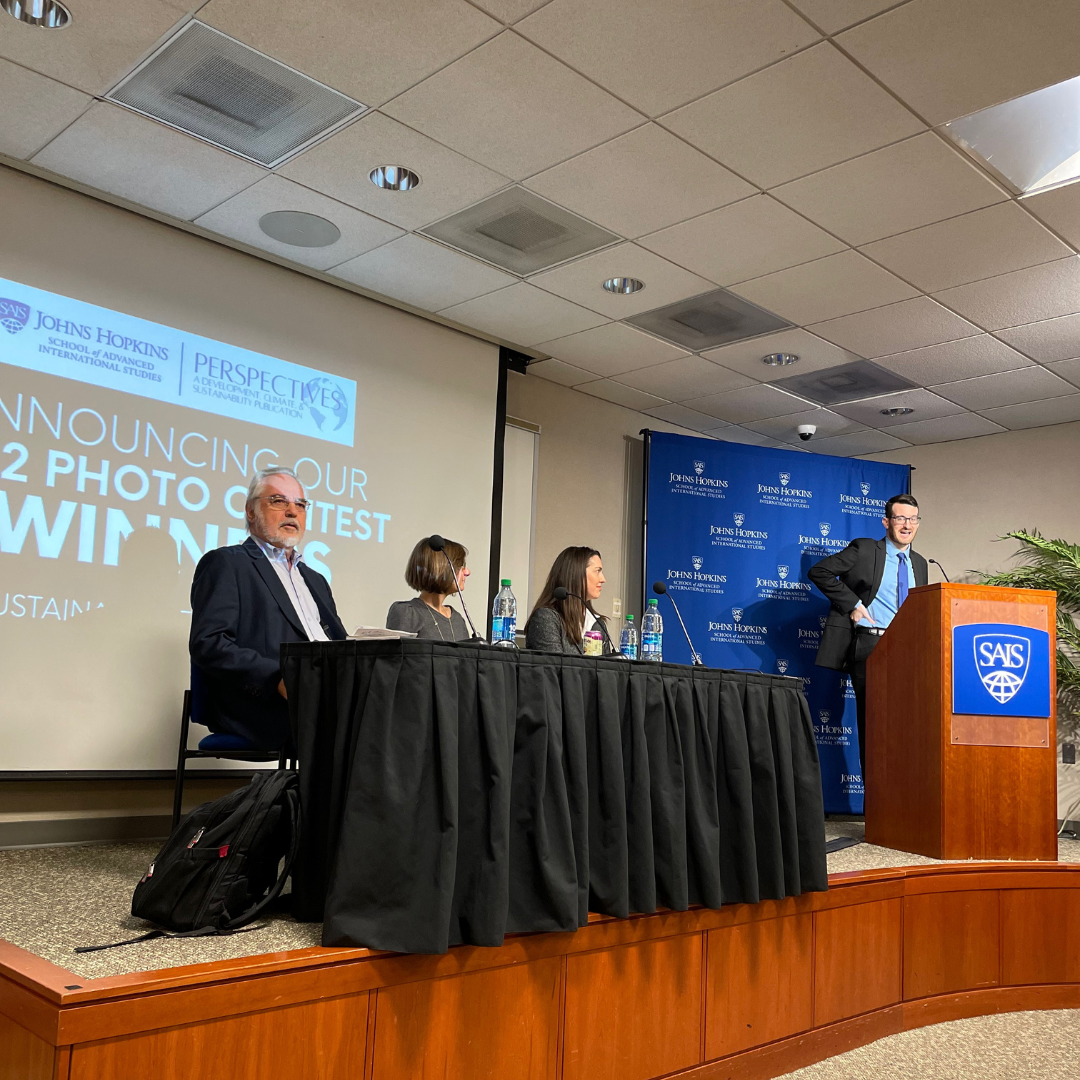BY THE PERSPECTIVES EDITORIAL TEAM
To celebrate the annual launch of their publication theme, SAIS Perspectives invited experienced professionals and experts to speak as panelists on the 2022-2023 theme of “Sustainable Development in Crisis.” Two panel discussions were hosted, with the first taking place at the SAIS campus in Washington D.C. and the second at the SAIS Europe campus in Bologna, Italy. Both discussions centered around the ways that moments of crisis, from COVID-19 to the climate crisis, are reshaping the field of international development. Panel and audience members also had the opportunity to talk about the ways that these challenges demand new approaches, including on the role of systems thinking, efficiency, and holistic project design.
On Monday, November 14, SAIS students and faculty gathered together to attend a panel which featured Meredith Caligiuri, who serves as Director for Africa at the Office of Foreign Assistance for the U.S. Department of State, and Dr. Kate Schneider, who is a Fellow at the Global Food Ethics & Policy Program at SAIS. Professor Brian Levy, Professor of the Practice of International Development at SAIS, moderated the discussion. Caligiuri and Schneider shared their views on how the development, energy, and environment sectors are addressing urgent challenges while faced with emerging and ongoing crises.
The conversation touched on the themes of efficiency and intersectionality in program design, careful consideration of what types and sources of expertise contribute to project success and place-based knowledge, and resource allocation in times of crises. Caligiuri emphasized the growing need for creativity and efficiency in development work, cautioning that there will always be a feeling that we don’t have enough for task at hand. This, she argued, is why effective, efficient policy making and program design is critical to ensure that each dollar is going as far as it can. We must ask the question - are we present in the right spaces and doing enough at the strategic and policy level so that we are able to achieve our policy agenda in meaningful ways? On this same note, because efficiency is so critical, we should look to cross-sectoral, rather than siloed, approached to programming. This means looking at programs holistically and examining how priorities have shifted over time.
In agreement, Schneider shared her perspective on the need for a focus on building resilience and diversifying and fortifying systems. Likewise, she urged students to consider the holistic nature of systems, for example the contributions of food systems to fuel use, climate change, and gender disparities, in order to achieve greater control of the outcomes. Projects and programs which take this approach, however, require strong and established relationships between stakeholders and various levels of governance.
Following their launch event in Washington D.C, SAIS Perspectives welcomed Professor Arntraud Hartmann, a Steve Muller Professor, to their panel at the SAIS Europe campus. On Tuesday, Dec 14, students gathered with Professor Hartmann for a discussion about development in crisis, her extensive career at the World Bank, and historic moments and trends in international development. Professor Hartman emphasized the importance of understanding the history of international development and the major transitions that multi and bi-lateral institutions have experienced since their inception. She shared with students the critical paradigm shifts that international organizations like the World Bank experienced as they navigated new identities post-war and post-1990s, towards a more holistic understanding of poverty. She described how development evolved from focusing solely on increasing economic growth to encompassing other qualities of empowerment and inclusion that allow individuals to lead fulfilled lives and developing their capacities through access to education, high quality healthcare, and potable water. In agreement with the panel that took place in D.C., Hartmann emphasized the importance of listening to and understanding local context.
This history, Hartmann explained, can serve as a foundation for understanding how the work of development organizations and practitioners is being reshaped as a result of the climate crisis. Students discussed with Hartmann the reversal of achievements in poverty reduction, which have occurred under the pandemic – in part as a result of high food prices. She noted that these reversals are highly concentrated in India and least developed and fragile countries. As the conversation moved towards the impacts of climate change, Hartmann highlighted that a key area for progress is in the nascent climate standards (as a part of environmental and social safeguards) and the lack of a global goods agenda.
The winners and finalists for the SAIS Perspectives Photo Contest were also announced. SAIS student Xiangxue Zheng was awarded first place for his photo titled “Weightlifting Champions.” The winning photos can be found here on the SAIS Perspectives website. We encourage anyone who is curious about submitting to this year’s theme to visit this page for more information, or to send us an email at sais.perspectives@gmail.com.

